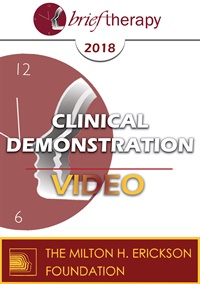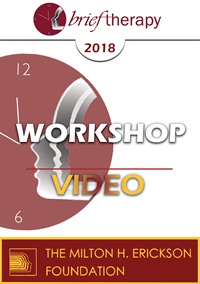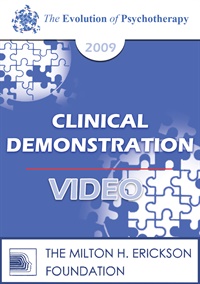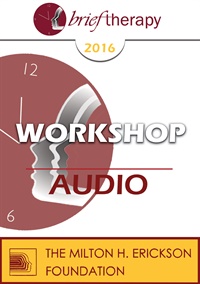
- Average Rating:
- Not yet rated
- Topic Areas:
- Anxiety | Workshops | Brief Therapy | Therapeutic Relationship
- Categories:
- Brief Therapy Conference | Brief Therapy Conference 2016
- Faculty:
- Reid Wilson, PhD
- Duration:
- 2:43:49
- Format:
- Audio Only
- Original Program Date:
- Dec 09, 2016
- Short Description:
- A powerful framework for mastering anxiety using cognitive and behavioral strategies. The session outlines key vulnerabilities, symptom-maintaining behaviors, and targeted interventions to reduce anxiety. With compelling case studies and exposure techniques—including interoceptive tasks and self-talk—Wilson shows how clients can retrain their response to fear. Emphasis is placed on embracing discomfort, shifting mindset, and achieving rapid change, with evidence-backed success rates for OCD and panic disorder. Free tools and resources are also shared.
- Price:
- $15.00 - Base Price

- Average Rating:
- Not yet rated
- Topic Areas:
- Workshops | Brief Therapy | Therapeutic Relationship | Therapist Development
- Categories:
- Brief Therapy Conference | Brief Therapy Conference 2016
- Faculty:
- Bill O'Hanlon, MS
- Duration:
- 2:47:28
- Format:
- Audio Only
- Original Program Date:
- Dec 11, 2016
- Short Description:
- There are features that most brief therapies share. Dropping all the theoretical jargon, it becomes very simple. This presentation will provide a simple way to get therapy started on the right foot so it ends well and as quickly as possible.
- Price:
- $15.00 - Base Price

- Average Rating:
- Not yet rated
- Topic Areas:
- Psychotherapy | Workshops | Attunement | Therapeutic Relationship | Brief Therapy
- Categories:
- Brief Therapy Conference | Brief Therapy Conference 2016
- Faculty:
- Jeffrey Zeig, PhD
- Duration:
- 2:31:48
- Format:
- Audio Only
- Original Program Date:
- Dec 11, 2016
- Short Description:
- Attunement can be considered the deepest level of rapport, a foundation of empathy. We will learn how to attune to affect, behavior, cognition, attitude, perception, and relationship patterns —even how to attune to the preconscious associations that drive behavior. A precursor to every intervention, attunement will be described from the perspective of hypnosis, psychotherapy, and social psychology. Clinical applications will be demonstrated and discussed. Includes small-group practice exercises.
- Price:
- $15.00 - Base Price
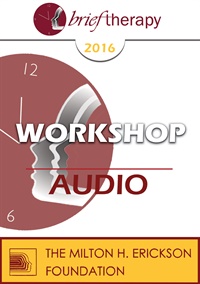
- Average Rating:
- Not yet rated
- Topic Areas:
- Psychology | Workshops | Brief Therapy | Therapeutic Relationship | Relationships
- Categories:
- Brief Therapy Conference | Brief Therapy Conference 2016
- Faculty:
- Bill O'Hanlon, MS
- Duration:
- 2:17:22
- Format:
- Audio Only
- Original Program Date:
- Dec 11, 2016
- Short Description:
- In brief therapy, we have to be better than long-term therapists in getting people to change and cooperate with treatment. Recent research from social psychology, behavioral economics and the new brain science show three powerful principles for being persuasive. Why do marketers know all this and most therapists do not? Come and learn how to be at least as persuasive as marketers.
- Price:
- $15.00 - Base Price
Credit available - Click Here for more information
- Average Rating:
- Not yet rated
- Topic Areas:
- Clinical Demonstrations | Brief Therapy | Ericksonian Hypnosis and Therapy Techniques | Hypnosis | Naturalistic | Therapeutic Relationship | Couples Therapy
- Bundle(s):
- Learning Track - Using Hypnosis
- Categories:
- Brief Therapy Conference | Brief Therapy Conference 2018 | Online Continuing Education
- Faculty:
- Camillo Loriedo, MD, PhD
- Course Levels:
- Master Degree or Higher in Health-Related Field
- Duration:
- 1:03:30
- Format:
- Audio and Video
- Original Program Date:
- Dec 08, 2018
- Short Description:
- As suggested by Milton Erickson, naturalistic hypnosis seems to be one of the best way of utilizing couple’s resources. Frequently couples fail in reaching a deep mutual exchange and complain of being unable to satisfy their needs for intimacy. Hypnotic experience seems to produce by itself a deep contact that rarely develops in their habitual patterns. Specific couple’s responses to hypnotic induction that can be utilized to produce contact and intimacy will be demonstrated. In some other cases couples are caught by conflicts they are unable to solve. A couples hypnotherapist can extend to both couple members rapport, and succeed in obtaining a special relationship that produces more syntonic and attuned behaviors, in which conflict intensity decreases and a greater ability to listen to each other and negotiate con
- Price:
-
Sale is $29.00
price reduced from Base Price - $59.00
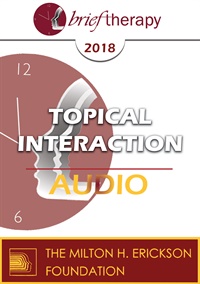
- Average Rating:
- Not yet rated
- Topic Areas:
- Topical Interactions | Psychotherapy | Brief Therapy | Therapeutic Relationship | Therapist Development
- Categories:
- Brief Therapy Conference | Brief Therapy Conference 2018
- Faculty:
- Stephen Gilligan, PhD
- Duration:
- 1:04:33
- Format:
- Audio Only
- Original Program Date:
- Dec 08, 2018
- Short Description:
- Every meaningful therapy conversation includes a significant presence of difficult emotions--symptoms, responses, anger, fear, etc. We will have a conversation about how to skillfully welcome and utilize such negative experiences as integral parts of a successful, creative therapy.
- Price:
- $15.00 - Base Price
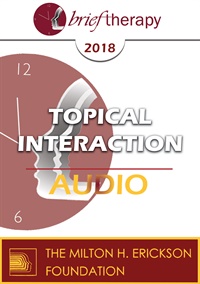
- Average Rating:
- Not yet rated
- Topic Areas:
- Topical Interactions | Feedback Informed Treatment (FIT) | Tailoring | Relationships | Therapeutic Relationship | Therapist Development
- Categories:
- Brief Therapy Conference | Brief Therapy Conference 2018
- Faculty:
- Scott Miller, PhD
- Duration:
- 57:17
- Format:
- Audio Only
- Original Program Date:
- Dec 08, 2018
- Short Description:
- Available evidence indicates that the effectiveness of psychotherapy has not improved despite 100 years of theorizing and research. What would help? Not learning a new model of therapy or the “latest” so-called “evidence-based” treatment approach. A simple, valid, and reliable alternative exists for maximizing the effectiveness and efficiency of treatment based on using ongoing feedback to empirically tailor services to the individual client needs and characteristics. Research from multiple randomized clinical trials documents that this simple, transtheoretical approach as much as doubles the effectiveness of treatment while simultaneously reducing costs, drop-out rates and deterioration. At this "Topical Interaction," participants will have a chance to address any practical issues, questions or challenges associated with incorporating outcome and alliance measures into their practice.
- Price:
- $15.00 - Base Price
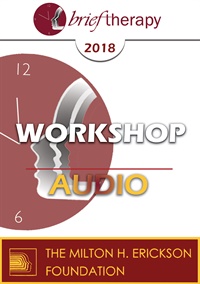
- Average Rating:
- Not yet rated
- Topic Areas:
- Workshops | Brief Therapy | Therapeutic Relationship | Therapist Development
- Categories:
- Brief Therapy Conference | Brief Therapy Conference 2018
- Faculty:
- Bob Bertolino, PhD
- Duration:
- 1:59:16
- Format:
- Audio Only
- Original Program Date:
- Dec 07, 2018
- Short Description:
- Effective clinicians draw on various sources of external knowledge to inform practice. One source can be found in the models of today which are popularized in numerous books and training opportunities. A second source is comprised of discoveries in fields such as medicine, education, philosophy, art, spirituality, and the sciences. Although these two sources provide a wealth of knowledge, effective practitioners also rely on a third source that not only serves as a foundation for practice but also informs treatment strategies. The third source is rooted in traditional psychotherapy theories and the contributions of early pioneers.
- Price:
- $15.00 - Base Price
Credit available - Click Here for more information
- Average Rating:
- Not yet rated
- Topic Areas:
- Workshops | Brief Therapy | Therapeutic Relationship | Therapist Development | Neuroscience
- Categories:
- Brief Therapy Conference | Brief Therapy Conference 2018 | Online Continuing Education
- Faculty:
- Stephen Gilligan, PhD
- Course Levels:
- Master Degree or Higher in Health-Related Field
- Duration:
- 2:00:04
- Format:
- Audio and Video
- Original Program Date:
- Dec 07, 2018
- Short Description:
- By virtue of our "mirror neurons", it is impossible for therapists to not be deeply touched by client's experiences. We will explore how this can be done skillfully and safely, thereby opening multiple pathways of feedback, compassion, and technical competencies. Special attention will be to mindful activation of the three "minds" of somatic, cognitive, and relational field intelligence, again with the intent of creating a deep and sophisticated conversational connection.
- Price:
-
Sale is $29.00
price reduced from Base Price - $59.00

- Average Rating:
- Not yet rated
- Topic Areas:
- Keynotes | Neuroscience | Couples Therapy | Therapeutic Relationship
- Categories:
- Couples Conference | Couples Conference 2011
- Faculty:
- Daniel Amen, MD
- Duration:
- 2:12:44
- Format:
- Audio Only
- Original Program Date:
- Apr 01, 2011
- Short Description:
- This keynote explores how understanding individual brain types can transform treatment for mood, anxiety, and relationship challenges. Participants learn how neuroimaging reveals distinct patterns linked to impulsivity, rigidity, and emotional reactivity, and how tailored interventions—from exercise and nutrition to supplements and psychotherapy—can restore balance. The session offers a practical, brain-based approach to improving mental health, relationships, and overall well-being.
- Price:
- $15.00 - Base Price

- Average Rating:
- Not yet rated
- Topic Areas:
- Emotionally Focused Therapy (EFT) | Workshops | Couples Therapy | Relationships | Therapeutic Relationship
- Categories:
- Couples Conference | Couples Conference 2012
- Faculty:
- Scott R. Woolley, PhD
- Duration:
- 1:26:46
- Format:
- Audio Only
- Original Program Date:
- Apr 29, 2012
- Short Description:
- Most couples have at least one partner who withdraws. To bring about lasting change, withdrawers have to engage in the process of therapy and most importantly they must reengage in the relationship. Using video examples, this workshop focuses on how to engage withdrawers and help them reengage with their partners.
- Price:
- $15.00 - Base Price
- Average Rating:
- Not yet rated
- Topic Areas:
- Keynotes | Therapeutic Relationship | Therapist Development | Couples Therapy
- Categories:
- Couples Conference | Couples Conference 2022 | Pioneers in Couples and Family Therapy
- Faculty:
- William Doherty, PhD
- Course Levels:
- Master Degree or Higher in Health-Related Field
- Duration:
- 57:40
- Format:
- Audio and Video
- Original Program Date:
- Jun 24, 2022
- Short Description:
- In this golden age for models of couples therapy, therapists may wonder if they should be practicing the “one best model.” The research is clear that couples therapy models that have been tested are about equally effective, and that there are a number of key ingredients in any effective way to practice couples therapy. The presenter will describe these key ingredients that cut across models and some skills necessary to practice any model. He will argue that since this therapy is about improving relationships, the relationships we establish with our couple clients—balanced, caring, and sometimes challenging—are the heart of what we have to do well.
- Price:
- $59.00 - Base Price
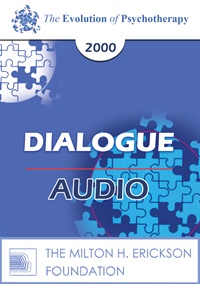
- Average Rating:
- Not yet rated
- Topic Areas:
- Psychotherapy | Dialogues | Therapeutic Relationship | Therapist Development
- Categories:
- Evolution of Psychotherapy | Evolution of Psychotherapy 2000
- Faculty:
- Albert Ellis, PhD | Eugene Gendlin, PhD
- Duration:
- 55 Minutes
- Format:
- Audio Only
- Original Program Date:
- May 27, 2000
- Short Description:
- EP00 Dialogue 02 - The Therapeutic Relationship - Albert Ellis, Ph.D., and Eugene Gendlin, Ph.D. Given a topic, to become aware of the differing approaches to psychotherapy, and to identify the strengths and weaknesses in each approach. Moderated by Ellyn Bader, Ph.D.
- Price:
- $15.00 - Base Price
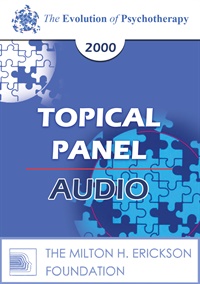
- Average Rating:
- Not yet rated
- Topic Areas:
- Topical Panels | Psychotherapy | Therapeutic Relationship | Therapist Development
- Categories:
- Evolution of Psychotherapy | Evolution of Psychotherapy 2000 | Pioneers in Couples and Family Therapy
- Faculty:
- Claudia Black, PhD | James Bugental, PhD | Bert Hellinger, MA, Dipl. Psych | Otto Kernberg, MD
- Duration:
- 56 Minutes
- Format:
- Audio Only
- Original Program Date:
- May 27, 2000
- Short Description:
- This panel addresses therapist-client dynamics in psychotherapy, emphasizing safety, self-awareness, and ethical practice. Black focuses on supporting clients through self-destructive patterns and normalizing their experiences. Bugental discusses training clients to participate effectively in therapy. Hellinger shares insights on family constellations to uncover hidden family dynamics. Kernberg highlights the need for neutrality, clinical expertise, and confidentiality. Additional topics include managed care, belief systems, and the complexities of eclectic approaches.
- Price:
- $15.00 - Base Price
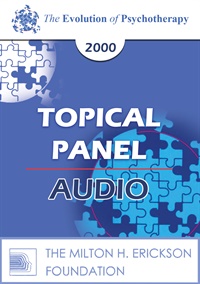
- Average Rating:
- Not yet rated
- Topic Areas:
- Topical Panels | Therapeutic Relationship | Therapist Development
- Categories:
- Evolution of Psychotherapy | Evolution of Psychotherapy 2000 | Pioneers in Couples and Family Therapy
- Faculty:
- Ray Corsini, PhD | Peggy Papp, ACSW | Judd Marmor | Irvin Yalom, PhD
- Duration:
- 55 Minutes
- Format:
- Audio Only
- Original Program Date:
- May 28, 2000
- Short Description:
- This panel examines the changing nature of the therapist-client relationship, moving from traditional Freudian models to more interpersonal and collaborative approaches. Topics include the value of self-disclosure, maintaining boundaries, therapist-client friendships, ethical concerns, and the impact of personal values. The conversation also touches on internet-based therapy and the importance of recognizing the therapist’s humanity in fostering meaningful connections. Moderated by Brent Geary, PhD.
- Price:
- $15.00 - Base Price
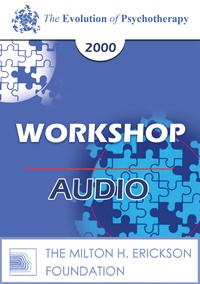
- Average Rating:
- Not yet rated
- Topic Areas:
- Psychotherapy | Workshops | Therapeutic Relationship | Therapist Development
- Categories:
- Evolution of Psychotherapy | Evolution of Psychotherapy 2000
- Faculty:
- Judd Marmor
- Duration:
- 2 Hours 10 Minutes
- Format:
- Audio Only
- Original Program Date:
- May 25, 2000
- Short Description:
- This workshop will attempt to describe certain common factors that, in my opinion, are present in all forms of effective psychotherapy. Examples will be presented and discussed.
- Price:
- $15.00 - Base Price
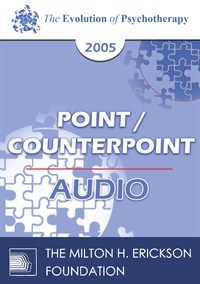
- Average Rating:
- Not yet rated
- Topic Areas:
- Point/Counterpoint Sessions | Psychotherapy | Therapeutic Relationship | Therapist Development
- Categories:
- Evolution of Psychotherapy | Evolution of Psychotherapy 2005
- Faculty:
- Arnold Lazarus, Ph.D. | Ernest Rossi, PhD
- Duration:
- 1 Hour 19 Minutes
- Format:
- Audio Only
- Original Program Date:
- Dec 07, 2005
- Short Description:
- Boundary crossings can be extremely helpful, whereas boundary violations are usually harmful. Therapy is often shortchanged by the tendency to practice defensively. It is imperative not to exploit, disparage, abuse or harass a client. We also must appreciate the significance of confidentiality, integrity, respect and informed consent. All the rest of the ethical rules, codes and regulations are negotiable. Thus, non-sexual dual relationships often can enhance the process and outcome of psychotherapy.
- Price:
- $15.00 - Base Price
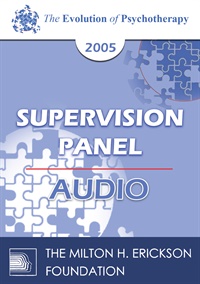
- Average Rating:
- Not yet rated
- Topic Areas:
- Supervision Panels | Supervision | Psychotherapy | Cultural and Social Contexts | Family Therapy | Strategic Therapy | Therapeutic Relationship | Therapist Development
- Categories:
- Evolution of Psychotherapy | Evolution of Psychotherapy 2005 | Pioneers in Couples and Family Therapy
- Faculty:
- James F. Masterson, MD | Salvador Minuchin, MD | Jeffrey Zeig, PhD
- Duration:
- 57 Minutes
- Format:
- Audio Only
- Original Program Date:
- Dec 09, 2005
- Short Description:
- A candid look at real cases presented in supervision, covering issues like school refusal, family tension, and unhealthy relationships. Panelists share a range of strategies—from paradoxical interventions to systemic reframing—while reflecting on how therapist style, client readiness, and family dynamics shape the path forward. Moderated by Camillo Loriedo, MD
- Price:
- $15.00 - Base Price
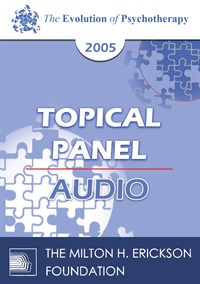
- Average Rating:
- Not yet rated
- Topic Areas:
- Topical Panels | Therapeutic Relationship | Therapist Development
- Categories:
- Evolution of Psychotherapy | Evolution of Psychotherapy 2005
- Faculty:
- Mary Goulding, MSW | Harriet Lerner, PhD | Erving Polster, PhD | Daniel Siegel, MD
- Duration:
- 1 Hour
- Format:
- Audio Only
- Original Program Date:
- Dec 09, 2005
- Short Description:
- Topical Panel 07 from the Evolution of Psychotherapy 2005 - The Patient/Therapist Relationship Featuring Mary Goulding, MSW; Harriet Lerner, PhD; Erving Polster, PhD; and Daniel Siegel, MD Moderated by Brent Geary, PhD
- Price:
- $15.00 - Base Price
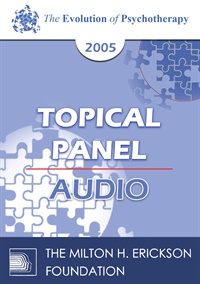
- Average Rating:
- Not yet rated
- Topic Areas:
- Topical Panels | Psychotherapy | Therapeutic Relationship | Therapist Development | Intervention Strategies
- Categories:
- Evolution of Psychotherapy | Evolution of Psychotherapy 2005 | Pioneers in Couples and Family Therapy
- Faculty:
- Claudia Black, PhD | William Glasser, MD | Salvador Minuchin, MD | Ernest Rossi, PhD
- Duration:
- 58 Minutes
- Format:
- Audio Only
- Original Program Date:
- Dec 09, 2005
- Short Description:
- An exploration of therapists' and patients' changing dynamics in psychotherapy, highlighting creative therapeutic processes, addiction treatment strategies, power dynamics in relationships, and systemic approaches to healing. Panelists address challenges in cross-cultural therapy and the importance of creating safe, supportive environments for client transformation. Moderated by Brent Geary.
- Price:
- $15.00 - Base Price
- Average Rating:
- Not yet rated
- Topic Areas:
- Workshops | Personality Disorders | Psychoanalysis | Psychotherapy | Therapeutic Relationship | Transference / Countertransference
- Categories:
- Evolution of Psychotherapy | Evolution of Psychotherapy 2005
- Faculty:
- James F. Masterson, MD
- Course Levels:
- Master Degree or Higher in Health-Related Field
- Duration:
- 2:39:20
- Format:
- Audio and Video
- Original Program Date:
- Dec 07, 2005
- Short Description:
- The therapeutic alliance is described along with transference and transference acting-out. The therapeutic task is defined - i.e., to help the patient convert transference acting-out to therapeutic alliance and transference through appropriate interventions. The psychotherapy of each of the disorders (Borderline, Narcissistic and Schizoid) is described in terms of indications, therapeutic technique and goals. Clinical examples will be given. Two videotapes of psychotherapy will be presented- one with a Borderline patient and the other with a Narcissistic disorder. Countertransference problems are described.
- Price:
-
Sale is $29.00
price reduced from Base Price - $59.00
- Average Rating:
- Not yet rated
- Topic Areas:
- Clinical Demonstrations | Psychotherapy | Relationships | Therapeutic Relationship | Motivation | Goals of the Therapist
- Categories:
- Evolution of Psychotherapy | Evolution of Psychotherapy 2009
- Faculty:
- Erving Polster, PhD
- Course Levels:
- Master Degree or Higher in Health-Related Field
- Duration:
- 59:32
- Format:
- Audio and Video
- Original Program Date:
- Dec 11, 2009
- Short Description:
- Educational Objectives: To describe how “immediate nextness”, followed continuingly, will lead to the achievement of therapeutic goals. To describe how absorbed relationship is a leavening process for the increased motivation of clients.
- Price:
-
Sale is $29.00
price reduced from Base Price - $59.00
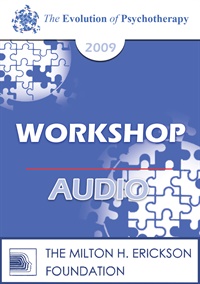
- Average Rating:
- Not yet rated
- Topic Areas:
- Psychotherapy | Workshops | Attunement | Therapeutic Relationship | Therapist Development
- Categories:
- Evolution of Psychotherapy | Evolution of Psychotherapy 2009
- Faculty:
- Jeffrey Zeig, PhD
- Duration:
- 1 Hour 43 Minutes
- Format:
- Audio Only
- Original Program Date:
- Dec 13, 2009
- Short Description:
- Attunement can be considered the deepest level of rapport, a foundation of empathy. We will learn how to attune to affect,behavior, cognition, attitude, perception, and relationship patterns – even how to attune to the preconscious associations that drive behavior. A precursor to every intervention, attunement will be described from the perspective of hypnosis, psychotherapy, and social psychology. Clinical applications will be demonstrated and discussed. Includes small-group practice exercises.
- Price:
- $15.00 - Base Price
- Average Rating:
- Not yet rated
- Topic Areas:
- Clinical Demonstrations | Psychotherapy | Feedback Informed Treatment (FIT) | Relationships | Therapeutic Relationship | Tailoring | Therapist Development
- Categories:
- Evolution of Psychotherapy | Evolution of Psychotherapy 2013
- Faculty:
- Scott Miller, PhD
- Course Levels:
- Master Degree or Higher in Health-Related Field
- Duration:
- 1:00:38
- Format:
- Audio and Video
- Original Program Date:
- Dec 13, 2013
- Short Description:
- Feedback-Informed Treatment (FIT) dramatically improves both retention and outcome of behavioral health services. FIT involves routinely and formally soliciting feedback from clients regarding the therapeutic alliance and outcome of care and using the resulting information to inform and tailor service delivery. Dr. Miller will demonstrate how clinicians can integrate FIT into their work regardless of theoretical orientation or professional discipline.
- Price:
-
Sale is $29.00
price reduced from Base Price - $59.00
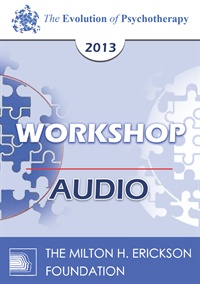
- Average Rating:
- Not yet rated
- Topic Areas:
- Workshops | Psychotherapy | Therapeutic Relationship | Therapist Development
- Categories:
- Evolution of Psychotherapy | Evolution of Psychotherapy 2013
- Faculty:
- Michael Yapko, PhD
- Duration:
- 2 Hours 47 Minutes
- Format:
- Audio Only
- Original Program Date:
- Dec 11, 2013
- Short Description:
- This workshop demonstrates how vague, global thinking can keep clients stuck and how learning to make fine distinctions opens the door to change. Through lively examples, practical exercises, and even stories from elephant training, the session shows how therapists can teach clients concrete skills for decision-making, boundary setting, and emotional regulation. Participants see how specificity and sequencing can transform overwhelm into clarity and action.
- Price:
- $15.00 - Base Price


